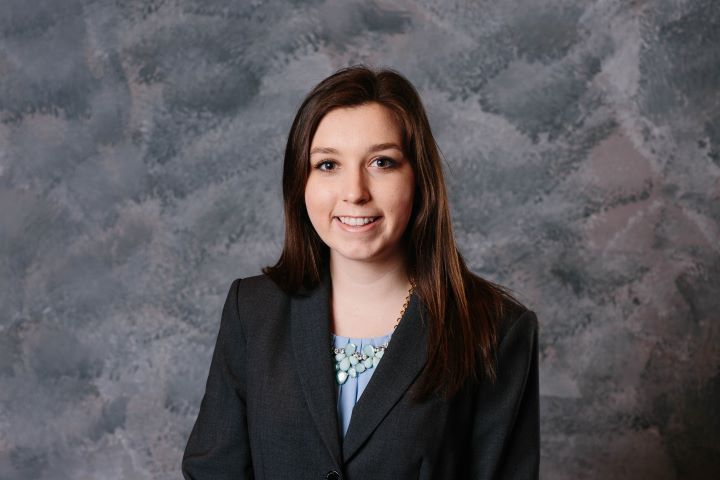It is often passion that drives students to do more than what’s required or expected of them. While students will often pursue additional learning opportunities about a given topic, it is a much larger step to become an advocate, raising awareness, at the local and state levels about the topic to help others.
Recent graduate student, Elena Pivek, accomplished this in the past year while completing her independent study under the mentorship of faculty members Dr. Jennine Harvey and Kim Adelman in the Department of Communication Sciences and Disorders. In addition to the requirements for her independent study project, she expanded her role towards advocacy and advancement in service delivery methods in the field of speech-language pathology.
Pivek completed research on the use of telerehabilitation for intervention with individuals who have aphasia. She wanted to investigate the topic due to her interest in the adult population and her knowledge about the lack of resources for clinicians in the area of telepractice. She hoped that her project could help uncover more about how speech-language pathologists (SLPs) can better serve this population.
It is important to highlight the need for telepractice with adult populations, specifically, those with aphasia. For instance, following a stroke, these individuals may need speech therapy to work on regaining previously learned language skills. Elena mentioned that patients with aphasia may have co-occurring mobility or geographic barriers that can interfere with receiving speech and language services in person. Telepractice is a viable therapy option for SLPs to take advantage of to ensure each patient’s speech therapy needs are being met.
Pivek’s exceptional work with her independent study brought her several valuable opportunities for learning and advocacy beyond her project, which she was eager to take part in. She went a step further by presenting to clinical educators at ISU’s Speech and Hearing Clinic, as well as at the Illinois Speech-Language-Hearing Association (ISHA) state conference earlier this year. Her presentation was titled “Considerations for Implementing Telerehabilitation Treatment Programs For Individuals With Chronic Aphasia.”
These presentations were a great opportunity for Elena to share her knowledge with curious SLPs, gain confidence in herself clinically and professionally, as well as obtain further insight into how practicing SLPs view concerns with telepractice. Pivek explained that her experience has helped her to understand the uncertainties about telepractice that are present with practicing SLPs. As telepractice is a relatively novel method of providing services to patients, she expressed that many SLPs have not yet had exposure to it. Her willingness to present her knowledge to various audiences could be a step towards telepractice becoming a more well-known option.
“The more information I can help to compile while sharing the benefits of telepractice will hopefully continue to increase awareness,” she said.
Pivek was also asked to be a student member on the ISHA Telepractice Committee. Along with this, she accepted the opportunity to write current articles for ISHA’s Journal, the ISHA Voice. Pivek’s first article, published in the April 2020 issue, was titled “Aphasia Telerehabilitation—What Does the Research Show?” She stated that it is has been very exciting to offer her input on topics and discuss with the Telepractice committee, as they also understand the benefits that telepractice can have on patients. Through this, Pivek was also able to learn about how the Telepractice Committee works to problem-solve and educate practicing SLPs.
Pivek earned her master’s degree in the program this May. She believed that all the hard work she put into her project has prepared her for a career in the field post-graduation. She stated that she is now better-equipped to find evidenced-based research to support her therapy practices.
A project like Pivek involving telepractice has even more relevance as SLPs navigate the COVID-19 pandemic. Pivek expressed that the Telepractice Committee has been receiving an influx of emails from SLPs across the state with questions. If any practicing SLPs would like more information about telepractice in general, Pivek said that they can visit the ASHA and ISHA websites.

